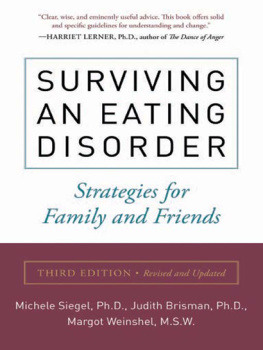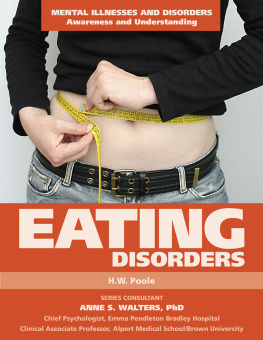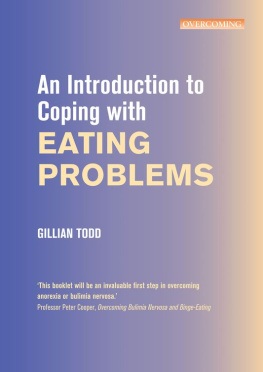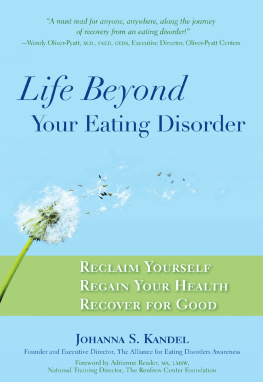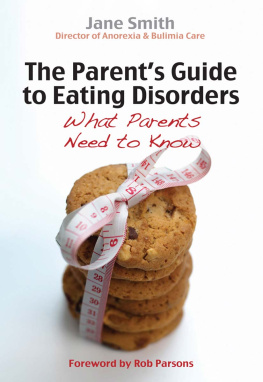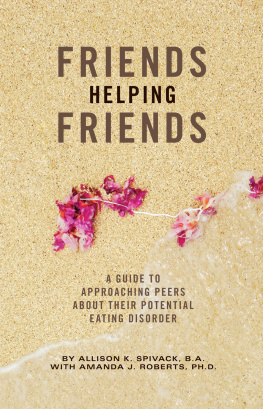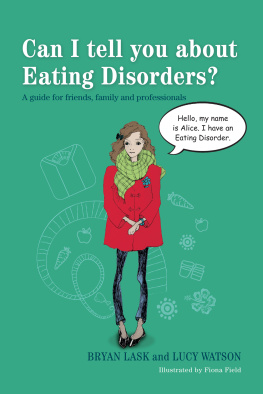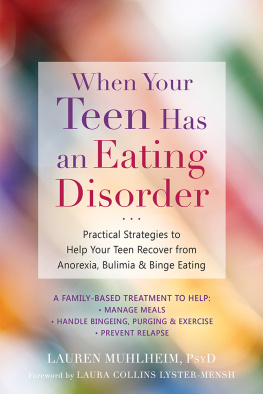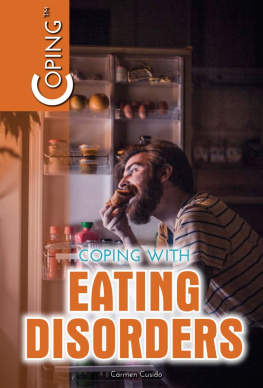Surviving an Eating Disorder
Strategies for Family and Friends
Third Edition Revised and Updated
Michele Siegel, Ph.D.
Judith Brisman, Ph.D.
Margot Weinshel, M.S.W.

To our patients and their families, who, in their
willingness to share their struggles, have asked us
the questions and taught us the answers.
Contents
How to Survive
Gaining Perspective
What You See:
The Behavioral Aspects of Eating Disorders
Hidden Feelings:
The Psychological Aspects of Eating Disorders
Rules and Relationships:
The Family Context of Eating Disorders
Confronting the Problem
No More Secrets:
Bringing It Out in the Open
When She Says Nothing Is Wrong:
Coping with Denial
No One Can Go It Alone:
Seeking Help
Using New Strategies
What to Do About the Problems with Food:
Practical Advice for Disengaging from the Food Fights
When Its Hard to Let Go:
Understanding What Keeps You So Involved
Developing a Healthier Relationship:
Relating to the Person, Not the Eating Disorder
One can only hope that it is possible to change the world by virtue of having lived a life. Michele Siegel lived a life filled with joy, spirit, and a laughter that embraced all around her. She also knew that the families we treated had been somehow lost in the mix, and she worked hard to change that. Surviving an Eating Disorder was Micheles idea, and for each family supported by this book, we want to acknowledge Michele for her inspiration from the start.
Frances Goldin, our agent, changes the world daily with an ever-present sense of dignity, fight, and quiet persistence (sometimes not so quiet!). She fought for this books stability and in that sense allowed Surviving to come alive. Changes in any readers life as a result of this book are in no small part thanks to her.
Our editor, Anne Cole, has been a steady and supportive force throughout, knowing that just a nuanced shift in direction can allow for a completely new route to travel. Melainie Rogers contributed her knowledge about nutrition with intelligence and clarity, in the very way she does when she works collaboratively with patients in treatment. Rebecca Johnson nearly sacrificed her holiday vacation to research the details of this book. She has helped to seamlessly pick up the pieces in many different arenas. We are very grateful. And the therapists at the Eating Disorder Resource Center in Manhattan are a mainstay source of support and intellectual challenge.
Julia and Senna Lauer cannot be thanked enough for their laughter and love and for teaching more than any training program could possibly allow. They provide the joy and richness of life that is an ongoing beacon guiding the way home.
Thanks to Robert, Rebecca, and Josh Bazell for their help in the original writing of this book. Stephanie Bazell was born when the first edition of Surviving was published. She, too, is 20 years old. Her support, knowledge, and humor during the writing of the revisions have been a great source of inspiration.
Finally, we thank our patients and their families for letting us know what worksand what doesnt. Without their voices, this book would be without truth and soul. Their words and experiences remind us always of what we need to know next.
How to Survive
Another 10 years have passed since the last revision of Surviving an Eating Disorder. Lives have changed; children have been born; life sometimes joyfully, sometimes relentlessly, moves forward. Memories of Michele Siegel, who died in 1993, have been woven into our souls. It was Micheles thinking, ideas, and humor that helped carry Surviving through its initial writing. Her words, sensibilities, and advice remain an integral part of the book.
Now interwoven into our lives are also the lives of our children. Our roles as parents have grown and shifted over these last years. Margot has shepherded her grown children into the world. Judiths daughters, who were only a thought during previous writings, are now richly embedded in her day-to-day life. The ever challenging and changing roles as parents have no doubt allowed us to speak to parents from within the trenches. We both know how fulfillingand complicatedparenting can be. We know from experience that there is never one solution to a problem, and the second you think you know what you are doing, something changes, and youre proven completely wrong. We come to this writing informed not just with new information but, perhaps more importantly, with new life experience.
Indeed, not only have we changed, but the culture has changed as well. Insurance informs how many treatments evolve. Shorter term inpatient stays are the norm now, so we have had to creatively consider what else can allow for a higher level of care when it is needed. The question now often is not if medication is needed, but which medication will best help. Intensive outpatient programs are often an ongoing part of the treatment experience.
As treatment options change, the role of parents changes as well. An intensive intervention to help parents refeed their anorexic child (the Maudsley approach) has nudged parents to the center of the treatment arena. Parents have been urged to take charge of their childrens eating and weight patterns and have been encouraged to play a more dominant role in the daily care of a child in trouble.
For some parents, however, involvement has been, at best, problematic. Here, interventions only exacerbate issues of intrusion and authoritative control. For others, refeeding helps at some points and results in crises at others. Questions remain: How can someone with an eating disorder best be supported in taking control of her own life? How can she battle behaviors that leave her victim to her own feelings or the needs and desires of others?
This latest edition of Surviving an Eating Disorder has been written to address the changes that have occurred since the first and second editions of this book. We have revisited the bedrock of our thinkingthat is, we want to understand what helps someone become responsible for her own lifeand we have integrated new information and research to consider what roles will best help the person with the eating disorder as well as anyone involved.
This book is written for all of you who are living with or in a relationship with someone who has an eating problem. Perhaps you are a parent, spouse, or sibling of the person with the problem. You may be a lover, roommate, colleague, or friend. You may already know that a disorder exists because signs of the problem are obvious, or a doctor or therapist may have diagnosed it. Or you may be aware of peculiar eating and/or weight problems but not know if a serious disorder is present. The person you know may or may not already be involved in some kind of treatment. As readers, you come to this book from a wide range of experiences with the sufferer.
Yours is a difficult position to be in. You want to help, but youre not sure what is best. You may be witness to many behaviors that are destructive and frightening, as well as disruptive to a household or a relationship. Not knowing what to do can make you feel helpless and confused.
To add to the confusion, the guidance you receive from professionals may completely contradict itself. Some professionals tell you to get in there and take control of the eating. Others tell you that any attempt to stop the disordered eating will result in a control battle that will only make the problem worse. With no clear-cut line of approach, you may be more confused than ever.

